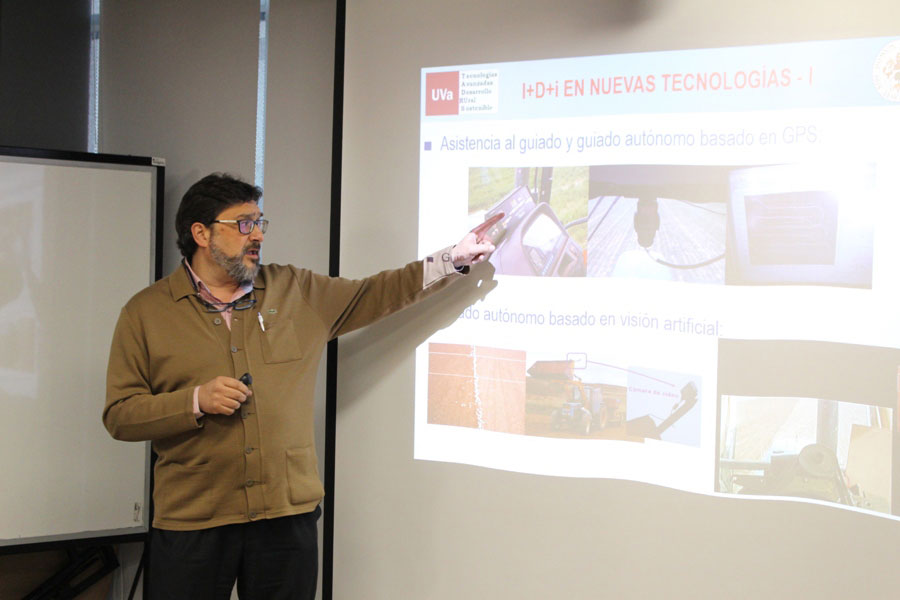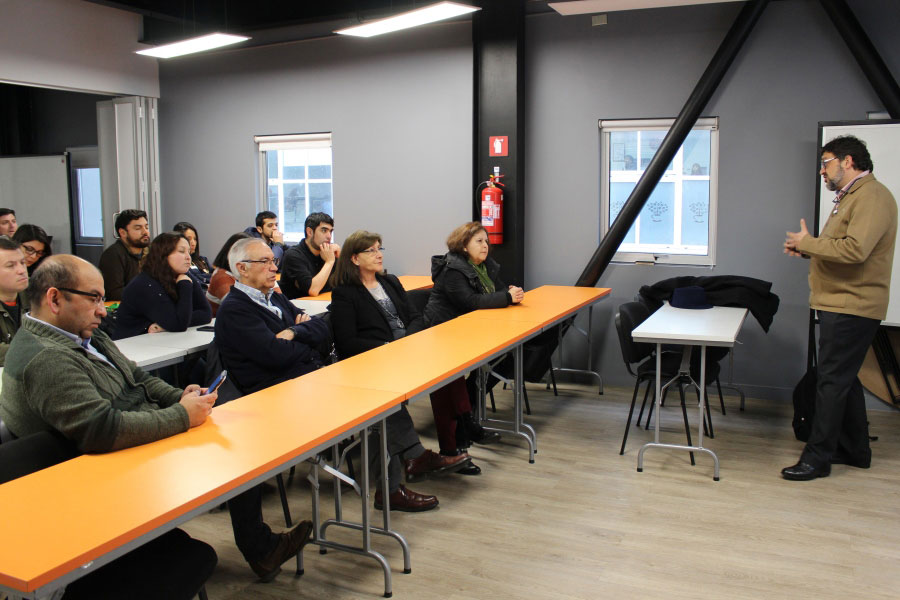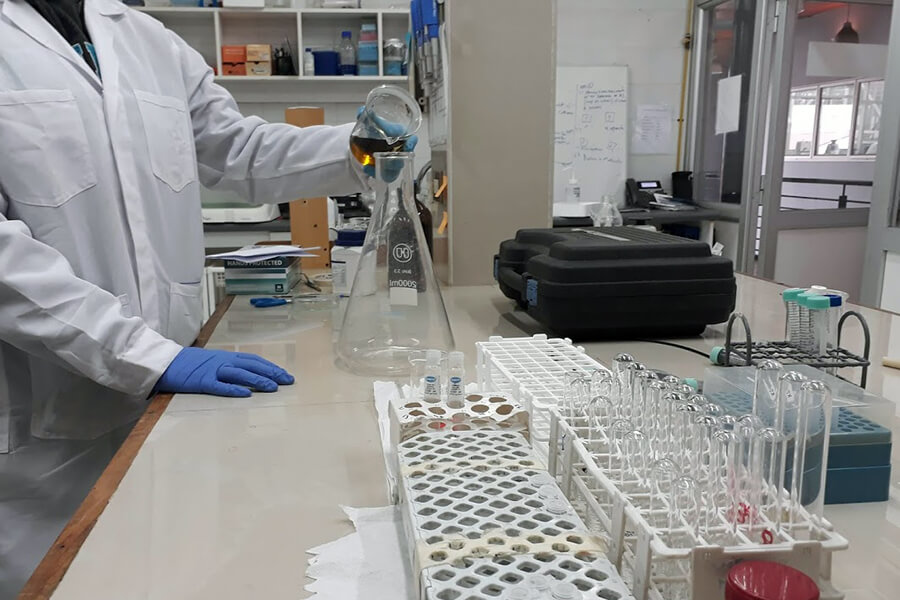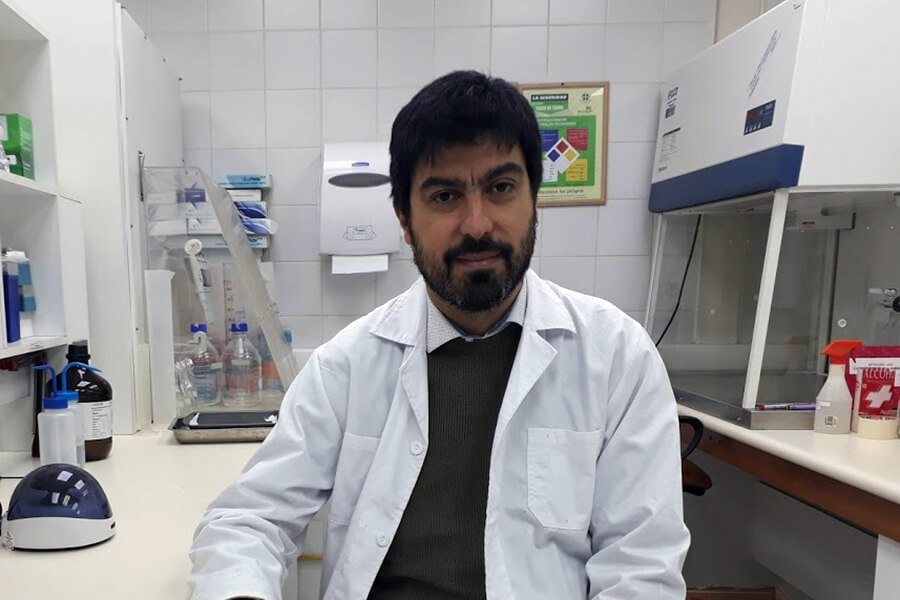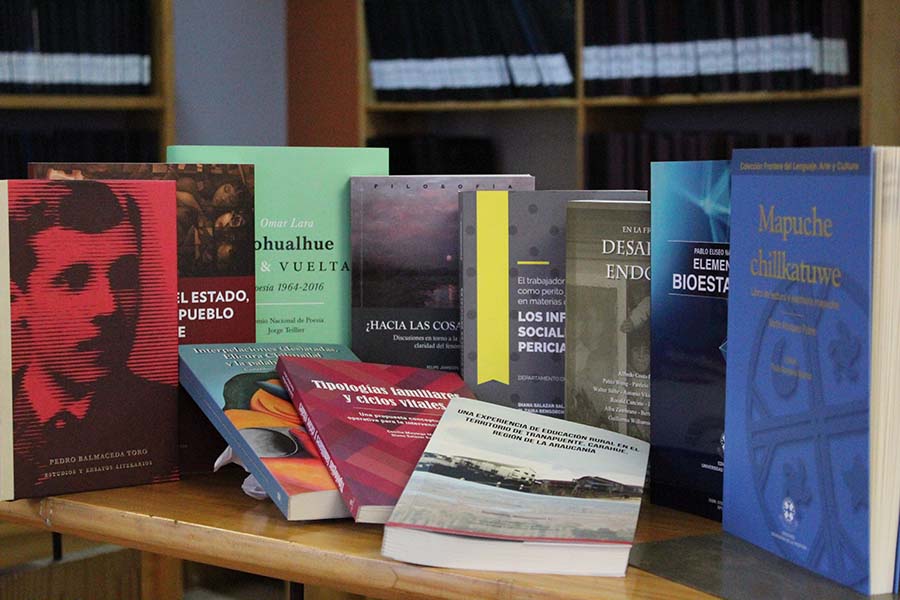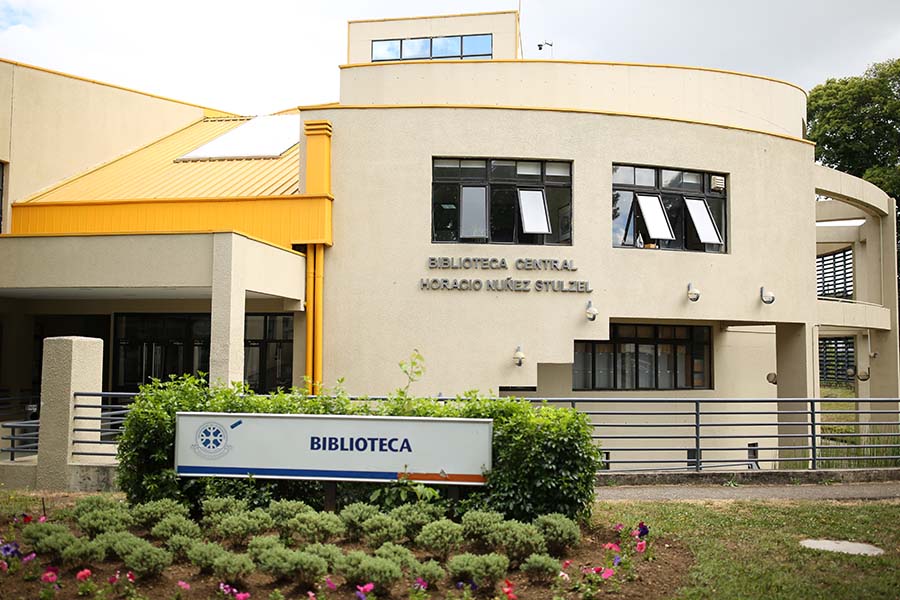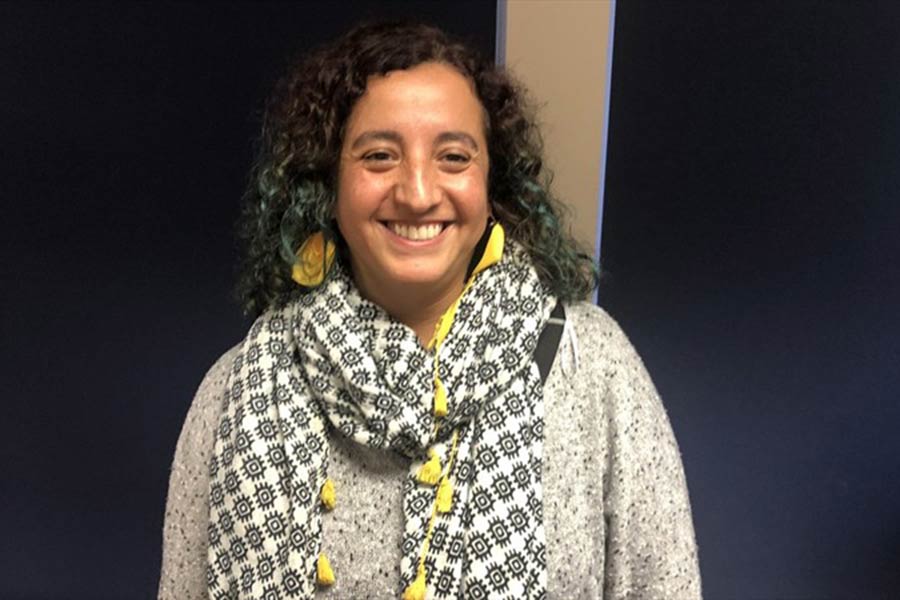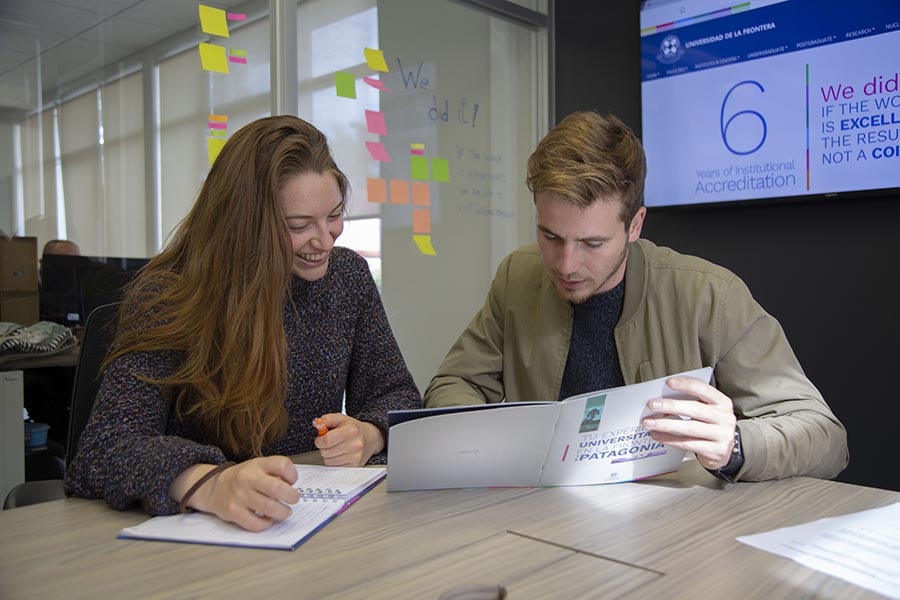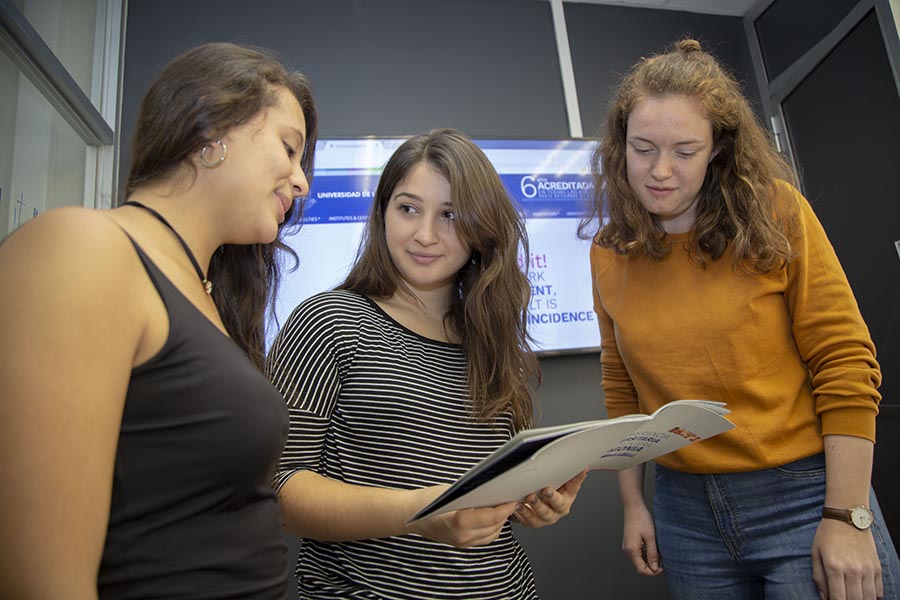|
Dr. Luis Manuel Navas was pleasantly surprised by the work and the possibilities of cooperation between both universities. |
Scientists of the Universidad de La Frontera (UFRO) organized a seminar and invited Dr. Luis Manuel Navas, an academic of the University of Valladolid (UVa) in Spain, with the intention of strengthening the partnership and international scientific cooperation. In order to display the options of joint research lines, the Research Center for Mycorrhizae and Agro-environmental Sustainability (CIMYSA) and the Center of Excellence in Biotechnological Research applied to the Environment (CIBAMA), both part of the Faculty of Engineering and Science of the UFRO, presented their work in the seminar, as well as the Recognized Research Group on Advanced Technologies for Sustainable Rural Development (GIR-TADRUS), which is coordinated by Dr. Navas at UVa. This is the first time that the expert in agricultural engineering came to the UFRO and he was pleasantly surprised by the work and the possibilities of cooperation between these three centers. “This university made a real good impression on me regarding its work in the fields related to the ones we are working on. Sciences; agricultural, agroforestry and agri-food engineering, amongst others – these are the fields in which I guess that we could move forward together, for example in the development of R&D, which we are all interested in,” Dr. Navas pointed out. Dr. Navas has been invited by Dr. Pablo Cornejo, the director of CIMYSA, and was able to learn about the different research initiatives of the UFRO, as well as to establish contact with academic researchers. His visit lasted five days and was part of the Erasmus+ Project KA107. For the near future, the researcher of UVa envisions topics associated with the environment as a joint field of action. He explained: “In Chile, as well as in Spain, we are having the same situation, the same problems and environmental impact. Therefore, what unites us is the possibility to try find scientific and technological solutions to those problems together.” It is worth mentioning that the alliance of these two centers of the UFRO Faculty of Engineering and Science with the Recognized Research Group on Advanced Technologies for Sustainable Rural Development is one of the dissemination activities of the project CONICYT/FONDAP/15130015, which is carried out by the Water Research Center for Agriculture and Mining (CRHIAM), and which the UFRO is a partner institution of.
 Written by: Daphne Bormann Parada Written by: Daphne Bormann ParadaFaculty of Engineering and Science |
|
Only 1% of the olive oil production wastes are reused, a situation that is an environmental problem in the agricultural sector at the international level. |
In ten years, the olive oil production in Chile grew 521%, producing annually between 17,500 and 21,000 tons of this rich food. It is a very positive scenery form the economic point of view, but not from the environmental point of view, since these processes generate about 157,500 tons of waste, which are not as easy to degrade as one might think. “In the field of agriculture, this kind of waste is the most complex,” Dr. Gustavo Ciudad, a researcher at the Universidad de La Frontera (UFRO) and the director of the Institute of the Environment, commented. This is why he is carrying out a Fondecyt (National Fund for Scientific and Technological Development) project, in order to treat this kind of waste with biotechnology and to use it for energy purposes. “An olive contains about 15% of oil. Through the best engineering process 10% can be extracted by press, unfortunately, the rest is waste, since it is a mixture of liquid, with parts of the seed, pulp and skin. The problem is that these wastes are phytotoxic, they affect the plants, and they also have a high content of recalcitrant organic matter. That means that it is difficult to biodegrade. This is where the first problems start, because they also accumulate in the same industry,” the researcher explained. THE IDEA The project contemplates the treatment of this complex alperujo in three stages. The first step is the pretreatment with fungi in order to increase its biodegradability. After that, the phase of anaerobic digestion starts, in order to rescue some of its energy value. And finally, it will be tested in soils. “The idea is to use white rot fungi that degrade lignocellulosic compounds and alperujo is rich in lignocellulosics, a composition that makes it difficult to degrade. Once the waste is partially biodegradable, we will turn over to a stage of anaerobic digestion that will transform it into another product, which is the digestate, also known as stabilized organic matter. This matter is rich in nutrients and can be applied to the soil,” Dr. Ciudad explained. The studies on this issue are being carried out at the laboratories of the Scientific and Technological Bioresource Nucleus (BIOREN-UFRO) and at the Institute of the Environment at the Universidad de La Frontera. One of the main analyses in this stage is to find alternatives for the acceleration of these processes, especially for those with fungi, which require a huge amount of time. The UFRO researchers who are participating in this study are Dr. Olga Rubilar, Dr. Cledir Santos and Dr. Alejandra Ribera. And also conversations with the Chilean Olive Oil Producers Association, called “Chile Oliva”, which brings the biggest olive oil producers in the country together, and with the Processed Food Studies Center (CEAP) of the University of Talca (Chile), which is located in the largest olive oil production zone in Chile, have started. At the same time, the project includes the participation of two researchers from Spain who are experts on this issue: Dr. Raul Muñoz of the University of Valladolid, who is an expert in projects on biotechnology and who was elected the researcher of the year in Spain in 2018; and Dr. Juan Miguel Romero García of the University of Jaén, who is working in direct contact with the olive oil producers in Andalusia, where the leading producers of Spain are located. INTERNATIONAL CONCERN In fact, this issue does not only concern the Chilean industry. It is also a global issue, especially in Europe, where several processes have been tested, but the technology could not be sufficiently developed, yet. One example is the anaerobic co-digestion, which consists of mixing the alperujo with other biodegradable matters, or thermal processes, which can get complicated because of the density of the waste. In this regard, this project proposes to do the procedure in wet conditions, directly in the alperujo and without the need to dry it. “And although this project is aimed at solving the problems that the Chilean industry currently has, with small companies, the results can be projected on an even larger scale,” concluded the researcher, whose project was in fourth place at the national level regarding the Regular Fondecyt projects awarded in 2018.
 Written by: Karimme Riadi Millas Written by: Karimme Riadi MillasUFRO Vice-rectorate for Research and Graduate Studies |
|
The academics of the Universidad de La Frontera will be able to disseminate their work in academic spaces of high importance in the world. This is another step towards internationalization. |
The cultivation and dissemination of knowledge, as well as the participation of our academics in international networks, are some of the main tasks of the Universidad de La Frontera (UFRO). In a new stage of development, UFRO University Press - Ediciones UFRO wanted to be part of these tasks and to continue the improvement of its processes and the strengthening of its advisory councils. It has taken significant steps in the elaboration of an agency that works together with important international publishing houses. This is what Dr. Carlos del Valle, the director of the UFRO Office of Libraries and Information Resources, pointed out: “The purpose of these co-edition agreements is, on the one hand, to make our publications more visible abroad and, on the other hand, to contribute to the scope of internationalization at our university. Therefore, we have been seeking for agreements with university publishing houses in Latin America and Europe and with other prestigious publishing houses in Europe that express their recognition towards our university this way. We are close to an important milestone for our university.” AGREEMENTS The co-edition agreements are the following: Firstly, the Global Culture & Politics Collection will be published in co-edition with Groningen University Press in the Netherlands this year, in Spanish as well as in English. Secondly, the Manuals of University Teaching will be published in co-edition with the Editorial Universidad de La Plata (University of La Plata) in Argentina. At the same time, there are different book proposals that are being reviewed for co-edition by the publishing houses of the Anaya Group, whose focus are these manuals and general teaching materials. Thirdly, the collections Estudios Postcoloniales (Postcolonial Studies), of Trans-disciplinary Investigations and Historias Críticas del Presente (Contemporary Critical Stories), will publish their books this year in co-edition with Éditions de la Maison des Sciences de l'Homme (FMSH) (literally “House of the Sciences of Man Editions”) in France and the Latin American Council of Social Sciences (CLACSO). Finally, the editorial adds alliances with two other important publishing houses, with which other publications are being evaluated. One of them is the Editorial Brill in the Netherlands, which was founded in 1683 and is one of the oldest publishing houses in the world. And the other one is Editions L'Harmattan, one of the biggest publishing houses in France. EXTERNAL ADVISORY COUNCIL GETS STRENGTHENED Additionally, and in accordance with the promotion of UFRO University Press, Dr. Jose Manuel Rodriguez, the coordinator of Ediciones UFRO, addressed the incorporation of new members to the External Advisory Council, who are added to a list of well-known academics of different fields of knowledge and literature, and said: “It is quite commonplace to talk about the need to create networks, but it is not easy to make them effective, since we need a direct partnership with those we want to work with.” “We always try to invite people we have effectively accomplished different tasks with, to ensure that the partnerships we have are effective and long-lasting. That is very important for the academic community, since the purpose of this international council is to open a space that is useful for us and that benefits everybody who is interested in promoting their texts,” the coordinator pointed out.
 Written by: Katherine Chavez Written by: Katherine ChavezUFRO Office of Libraries and Information Resources |
|
After several weeks of campaigning, the aspiration to bring young spirit into a significant position in higher education became a reality on Wednesday, July 24, when Natacha Pino Acuña was elected the new university rector of the University of Aysén, a Chilean state university, by the 27 authorized academic voters. The new rector elected is going to assume office on September 2, 2019 until 2023. |
It is a milestone in the history of state universities in Chile and goes in hand with the current demands of the society that seek stronger presence and representativeness of women in political decision-making positions. Natacha Pino Acuña was elected the first female university rector of one of the universities that are part of the CRUCH (Council of Rectors of Chilean Universities) state universities by her peers. She graduated in Civil Industrial Engineering from the Universidad de La Frontera (UFRO) in 2004 and demonstrated her commitment to the development of the regions of Chile since the beginning. This belief, which was also marked by an even greater vocation: the desire to pass her knowledge on to new generations, showed her the path that kept her more than seven years in the position of the director of the UFRO undergraduate program in Civil Industrial Engineering with specialization in Computer Science and in Bioprocesses. She was well appreciated by her students and the academic community of the Universidad de La Frontera and as the new rector of the University of Aysén, she sustained that this new challenge she is assuming today is an important task for the present and the future. “I accept this great challenge because I strongly believe that this new way of doing things, with a collaborative and effective governance model, will convert us into an institution of excellence in the region and the country,” she said. After several weeks of campaigning, the aspiration to bring young spirit into a significant position in higher education became a reality on Wednesday, July 24, when Natacha Pino Acuña was elected the new university rector of a Chilean state university by the 27 authorized academic voters. The Electoral Board informed that Natacha Pino got 14 votes out of 26 votes validly cast. The other 12 votes went to Maria Teresa Marshall. The new rector, elected by a majority of 53.85%, is going to assume office on September 2, 2019 until 2023. The University of Aysén transmitted the first impressions through its channels of institutional communication. "This has been an intense process. It was a month of hard work, designing the proposal together with my academic colleagues. It is a very important step for our university community, regarding the commitments and expectations we generated, but also regarding the result of the election, which was very close. It makes us think that we do not have an absolute advantage and that our peers who did not support our candidacy also have to be part of this new stage and that we have to include them in this project, what will be one of our first tasks,” the new university authority explained. Natacha Pino Acuña graduated from the Universidad de La Frontera in 2004. Afterwards, she worked for several years as an academic at the UFRO Faculty of Engineering and Science, led the management team of the Training Node of the Engineering Project 2030 and was the person in charge of the Social Responsibility Program. She accepted the challenge to contribute to the installation process of the University of Aysén and to lead the undergraduate program in Civil Industrial Engineering in November 2018. She has a Master’s Degree in Advanced Production, Logistics and Supply Chain Engineering from the Polytechnic University of Valencia (Spain) and is currently studying horticultural supply chains for her doctoral thesis. In addition, she is an active member of the executive coordination of the Chilean Network for Learning Services. Since the beginning of her professional career, she has been participating in different projects of local and regional interest, carrying out work that is linked to the municipalities, public services and territorial organizations, mainly in further training, consultancies and technical assistance in fields such as planning, strategies, quality accreditation systems, management control systems, entrepreneurship and project formulation, while putting industrial engineering at the service of the community, both in the public and private sector.
Photography by: University of Aysén
Written by: UFRO Communications Office |
|
UMAP, an organization of governmental and non-governmental representatives in higher education, brings outstanding institutions together and also benefits the Universidad de La Frontera through the different agreements that strengthen the international community. |
The Universidad de La Frontera continues the process of internationalization from its essence, with a cross-disciplinary outlook, being oriented towards communication, the creation of networks and new alliances with strategic partners. The International Affairs Office, always working in benefit of the university community, ultimately was able to make several important partnerships formal. In this regard, the alliance with the University Mobility in Asia and the Pacific (UMAP) Network, that brings well-known institutions in Asia and the Pacific together, clearly stands out, since it allows UFRO students to realize internships and stays abroad for four to six months in countries and territories that are part of UMAP. This possibility is open for institutions of 35 countries: Australia, Brunei, Cambodia, Canada, China, Ecuador, Fiji, Guam, India, Indonesia, Japan, Kazakhstan, Korea, Kyrgyz, Laos, Macao, Malaysia, Mexico, Mongolia, Myanmar, New Zealand, Papua New Guinea, Peru, Philippines, Reunion, Russia, Samoa, Singapore, Taiwan, Thailand, Timor-Leste, the USA and Vietnam. UNDERGRADUATE AGREEMENTS Within the framework of internationalization, the Universidad de La Frontera already increased the number of new or renewed partnerships with high-prestige institutions in 2019. A total of 16 agreements with institutions such as: Sungshin University (South Korea), Jinan University (China), Universitat Rovira I Virgili (Spain), Technical University Braunschweig (Germany), Catholic University Eichstätt-Ingolstadt (Germany), University of Economics and Human Sciences in Warsaw – Faculty of Management and Finance (Poland), University of Basel – Faculty of Humanities and Social Sciences (Switzerland), and University of Perugia – Department of Philosophy, Social Sciences and Education (Italy). In addition, the UFRO has different agreements with the National Autonomous University of Mexico, the Michoacan University of San Nicolas of Hidalgo (Mexico), the University of the Republic (Obstetrics) in Uruguay, the Dom Bosco Catholic University (Brazil), the National University of Córdoba (Faculty of Dentistry) in Argentina, the University of Business and Social Sciences (Faculty of Medicine) in Argentina, National University of Comahue – Faculty of Agricultural and Forestry Science (Argentina) and the Pontifical Bolivarian University, Bucaramanga Campus (Colombia). ATTRACTION OF STUDENTS Within the field of studies in Chile, the Chilean Agency for International Cooperation and Development (AGCID) initiated the Manuela Saenz Program for Student Mobility that seeks to strengthen student exchange and stays of undergraduate students from Ecuador and Paraguay, who completed at least half of their studies, for one semester. The cooperation of the UFRO with educational establishments in both countries identifies the relations with the Catholic University of Santiago de Guayaquil (Ecuador), the Central University of Ecuador, and the National University of Itapua in Paraguay. The Universidad de La Frontera calls this kind of connections “internationalization at home”, with the aim of improving the quality of the professional training from an intercultural perspective and of educating global citizens with diverse knowledge and experiences.
 Written by: UFRO Communications Office Written by: UFRO Communications OfficeThis email address is being protected from spambots. You need JavaScript enabled to view it. |





